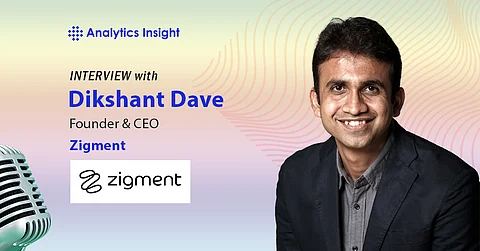

In today’s fast-paced marketing landscape, brands are moving beyond static dashboards and manual, generic outreach, embracing smarter, more dynamic ways to connect with customers. On a recent episode of the Analytics Insight Podcast, host Priya Dialani spoke with Dikshant Dave, Founder and CEO of Zigment.ai, to explore how agentic AI is transforming the way brands engage with customers.
Mr. Dave shared how Zigment is redefining marketing through intelligent AI assistants that adapt and act in real time, bringing a new level of personalization and efficiency to customer journeys.
Establishing Zigment as an AI-Native Marketing Orchestrator
Zigment.ai was built from the ground up in the post-LLM revolution era, positioning it as a native AI platform. Unlike traditional systems, Zigment harnesses a fleet of coordinated AI agents that autonomously manage marketing workflows across channels, email, social media, CRM, and more. These agents work together, orchestrating personalized customer journeys that adapt in real time.
Today’s customers navigate across platforms and leave behind rich, unstructured data, comments, chats, reviews, and questions. Zigment captures and utilizes this data to deliver a seamless, human-like brand experience. As Mr. Dave explains, “It’s about bringing marketing intelligence to where the customer is, not the other way around.”
Many businesses operate with fragmented MarTech stacks, where systems fail to communicate, and valuable context gets lost. Mr. Dave highlights that most marketing software works on structured data, barely 25% of what customers actually share. The remaining 70%, messages, preferences, and concerns, remain untapped.
Zigment tackles this issue by creating a “conversation graph,” a unified registry that merges structured and unstructured inputs. Whether a customer books a test drive, asks questions about features, or interacts via Instagram, Zigment threads these events into a single, contextual conversation—bridging gaps across teams and tools.
This approach has tangible outcomes. In one use case, Zigment’s AI agents replaced call center workflows for automotive test drives. Rather than funneling users through static forms and follow-up calls, the system engaged them through dynamic dialogues, answering questions, scheduling appointments, and following up with personalized messages. Conversion rates soared, and user satisfaction improved.
Agentic AI is more than automation; it’s a rethinking of how brands listen, understand, and act. By unifying data, maintaining context, and scaling personalized engagement, Zigment is helping businesses move from noise to nuance.
As the AI-native era unfolds, companies like Zigment are leading the charge, showing that when marketing meets intelligence, every customer moment can be meaningful.
